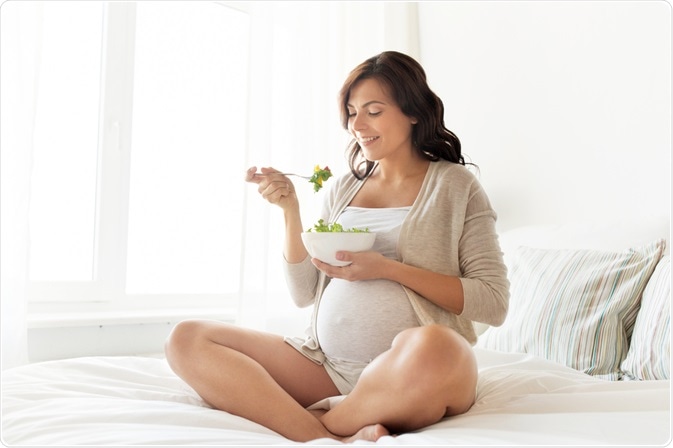Pregnancy is a time when many dramatic changes are known to occur in a woman’s body, both with respect to anatomy and its function.

Image Credit: Syda Productions / Shutterstock.com
Pregnancy is also a time when a new life is being nourished within the woman’s body, which includes the normal development of fetal organs. In every case, the nutrients for this enormous expenditure of energy and for the formation of one or more new individuals from scratch come solely from the mother.
Caloric intake
For these reasons, pregnant women must be taught and encouraged to have a balanced and palatable diet, with necessary supplementation of whichever nutrients they are likely to be lacking.
The total number of calories required per day increase by 340-450 calories, in the second and third trimesters respectively, granted that the woman is already of normal weight and is not malnourished. This is associated with a maternal weight gain of about 12 kilograms (kg) to 16 kg.
If this is lower than expected, there is a higher risk of low birth weight and prematurity, with a rise in fetal morbidity. However, excessive weight gain is also risky, as it is associated with fetal macrosomia, Cesarean sections, and maternal obesity which persists postpartum.
Recommended supplements
It is well established that folic acid supplementation in the periconceptional period, which is between four weeks and 12 weeks after conception, prevents neural tube defects. This is at a recommended dosage of 0.4 mg per day, though 10 times this amount is recommended for secondary prevention, particularly in those who have had a prior child with such a defect.
Prenatal iron supplements are also often recommended at about 27-30 millagrams (mg) per day, as most women in developing countries do not have sufficient iron reserves to carry them through the pregnancy without iron depletion. Iron supplementation is also important as iron deficiency results in anemia, as well as an increased risk of both maternal and fetal complications.
Vitamin C containing foods such as broccoli, strawberries, or orange juice can also aid in increasing iron absorption by converting the ferric form to the more digestible ferrous form.
Unsuitable foods
Listeriosis
Certain foods are unsuitable in pregnancy because they are associated with infectious agents. These include unpasteurized milk and dairy products, soft cheeses, smoked fish, and delicatessen meats.

Image Credit: Picturepartners / Shutterstock
Smoked fish and delicatessen meats, for example, should be heated to 74 ºC (165 ºF) before consumption. This is due to the potential involvement of these food products in listeria outbreaks. In fact, listeriosis is about 20 times more prevalent among pregnant women.
Listeriosis in pregnant women is often subclinical but may present with fever, body ache, nausea, vomiting, or diarrhea, all of which are common symptoms of the flu. The primary danger, therefore, is to the fetus, in whom the infection may be severe and can cause death.
The pregnancy may thus terminate in spontaneous miscarriage, stillbirths, preterm labor, and neonatal sepsis, though the risk may be reduced by treating the mother with a broad-spectrum antibiotic.
Salmonellosis
Raw and unpasteurized eggs are often used in baking, salad dressings, ice creams, and other sweet desserts. However, raw eggs are a major route of Salmonella transmission, which can cause food poisoning.
Symptoms of salmonella poisoning may include fever, nausea, cramping pain, and diarrhea. Bacteremia is known to occur in about 4 in 100 cases, which has the potential to cause intrauterine sepsis. For this reason, only pasteurized eggs should be consumed.
.jpg)
Image Credit: Tatiana Shepeleva / Shutterstock
Other infections
Seafood often contains noroviruses, vibrionaceae, some Salmonella species, and some protozoa. Most infections with these viruses are self-limiting; however, severe infections may sometimes require antibiotic treatment.
All seafood should be flash-frozen or cooked thoroughly. High mercury content is found in species such as tuna and shellfish; therefore, alternatives such as salmon, shrimp, and crab may be chosen for regular consumption in pregnant women.
Supplements
Dietary supplements other than prenatal vitamins should be avoided, on the whole. The dose taken should also be what is recommended by the healthcare provider, as high doses of the fat-soluble vitamins A, D, E, and K could be toxic to both the mother and the fetus. Herbal supplements are unregulated, meaning that their content and manufacturing practices are not known. Some may contain caffeine, which is better avoided.
Alcohol
Alcohol should also be strictly avoided in pregnancy even as an accompaniment to meals, for fear of fetal alcohol syndrome and other cognitive and behavioral impairments.
References
Further Reading
Last Updated: Oct 28, 2022